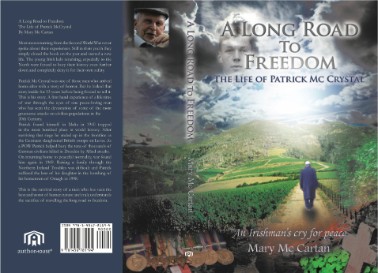About Us
Translate This Page
ISBN: 978-1-4567-8119-4
A Long Road To Freedom
Most men returning from World War 2 never spoke about their experiences. Still in their youth they simply closed the book on the past and started a new life. The young Irish lads returning, especially to the North were forced to bury their history even further down and completely deny it for their own safety.
Patrick Mc Crystal was one of those men who arrived home alive with a story of horror. But he locked that story inside for fifty-three years before being forced to tell it.This is his story. A first hand experience of a life time of war through the eyes of one Peace-loving man who has seen the devastation of some of the most gruesome attacks on civilian populations in the 20th Century.
Patrick found himself in Malta in 1940 trapped in the most bombed place in world history. After surviving the Siege of Malta he ended up in the frontline as the Germans slaughtered British Troops on Leros. As a POW Patrick helped bury the tens of thousands of German civilians killed in Dresden by Allied attacks. Returning home to peaceful normality, war found him again in 1969. Raising a family through the Northern Ireland Troubles was difficult and Patrick suffered the loss of his daughter in the bombing of his hometown of Omagh in 1998.
This is the survival story of a man who has seen the best and worst of human nature and truly understands the sacrifice of travelling the long road to freedom.
The decision to write this book has come after 68 years of silence about many of the most traumatic events of Packie’s life. He had decided to keep quiet in order to protect himself and his family from harm or narrow-minded bigotry in the highly emotive, divided community of Northern Ireland. Keeping his head down was the price he had to pay for daring to cross the line in his youth and he still feels anxious, even in 2010 about relating his past. In his early nineties his ambition to leave a legacy finally surpassed that fear. All his life he had been shy, avoiding attention and a little afraid of standing out in a crowd. Yet he was confident, full of fun and very self-assertive. Packie suddenly realised that his life was important and that his story needed to be heard. At last he realised that all he had experienced was for a purpose, so with the uniqueness of his maturity and a clear memory, his story of war comes pure, without the inflated bravado of youth. His story has not been tarnished by the years of embellished reciting of a hero’s story to an appreciative audience. Packie’s story has been protected in a safe cocoon of humility and silence, only nourished by a compassionate, intelligent and reflective heart and mind. He did not want to elaborate on gory details of battle or military logistics, as he simply wanted young people to hear the individual close-up account of the sufferings of war instead of always romancing in the satellite view of heroes and one-sided victory. He believed that it is important to understand that with every winner comes a defeated loser who is angry and eventually eager for revenge whether in their lifetime or by ensuring that the vendetta is past down to the next generations. Therefore if we use emotions instead of intelligence to correct the wrongs of the passed we will never get off the roundabout of revenge, which ultimately sparks war. If we all understood our emotional inheritance we could control our common passion for justice in a more intelligent and constructive manner. We all have more in common than to we think and all sides suffer in the conflict of war.
